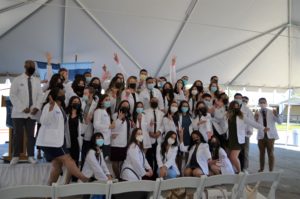Speak with an admissions advisor. 562-475-4604
Speak with an admissions advisor. 602-887-5780


According to the American Academy of Physician Associates (AAPA), today, there are close to 160,000 PAs practicing in the U.S., caring for more than 9 million patients every week, and making over 400 million patient interactions each year.
PAs are frequently referred to as physicians extenders because, like nurse practitioners, they are licensed healthcare professionals who can provide many of the same services as physicians. However, the time investment and subsequent cost to become a physician assistant is a fraction of what it takes to become a doctor.
In 1967, Duke University’s Medical Center graduated the first class of Physician Assistants in the country. The program was started to alleviate shortages of primary care doctors.
In California, the Physician’s Assistant Law (Statutes of 1970, Chapter 1327) was passed, introducing a new category of health care provider, termed the “physician’s assistant,” to redress “the growing shortage and geographic misdistribution of healthcare services in California.”
SCU’s Master of Science: Physician Assistant Program began in the Fall Term of 2016. The MSPA Program at SCU has produced over 150 PAs since the program began.


“Our graduates work in various specialities across the nation. We have alumni working in family medicine, emergency medicine, surgery, you name it!,” said Melanie Catalano, MSPA, PA-C, SCU MSPA Program Director.
PA Catalano says she “chose to become a PA because I value how the profession bridges the gap in healthcare between physicians and patients. The profession allows you to have a diverse array of specialties expanding your ability to serve those in need.”


The SCU MSPA Program spans 28 months, involving intensive, full-time study. MSPA students take didactic and clinical courses, including clinical skills training and supervised clinical practice experiences, resulting in a Master of Science: Physician Assistant degree. More than 2,000 hours are spent doing clinical rotations through a variety of healthcare specialties, including Internal Medicine, Pediatrics, Family Medicine, Women’s Health: Obstetrics and Gynecology, General Surgery, Behavioral Medicine, Emergency Medicine, Integrative Medicine, and many more.
“Clinical rotations give future PAs a broad knowledge base and training as a generalist, enabling them to fill gaps in healthcare wherever there’s a need. Upon completion of clinicals, PAs are qualified to conduct physical exams, diagnose and treat illnesses, order and interpret tests, write prescriptions, perform and assist in surgeries, and so on. After graduating, PAs are able to work in the field of medicine and healthcare, including research and academics,” said PA Catalano.


The SCU MSPA Program receives around 1,200 applications each year, conducts 200 interviews, per admissions cycle, and admits 50 students into each class.
The deadline for the current application cycle is Jan. 15, 2023 for a Sept. 5, 2023 start date. For full details on admissions requirements, visit the MSPA Admissions Requirements page.


“What distinguishes the PA program at SCU from others is the emphasis on Interprofessional Education (IPE) and whole-person, integrative healthcare,” said PA Catalano. “In today’s complex healthcare settings, it takes a team of professionals to provide patients with whole-person care. Healthcare is continuously changing and adapting, today, more than ever. Our current and future healthcare professionals need to be prepared to adapt to continuous change, as well as be prepared in interprofessional experiences for the transforming healthcare environment.”
Chanel Green says another reason she chose SCU’s MSPA Program “is because of the emphasis on integrative health. Treating patients isn’t just about prescribing medications, it’s about treating the patients as a whole. It is about understanding their mind, body, spirit and environment. At SCU – I believe I am getting a world class education on how to treat patients holistically with alternate medicine such as acupuncture and Chinese medicine, etc. I believe each patient is different and learning about different non-western treatments will allow me a better understanding of how educate the diverse demographics of patients I will be seeing in the future. The foundational skills and knowledge that I am receiving at SCU will empower me to be a well-rounded future practitioner.”


To fully meet the complex healthcare needs of patients, a broad range of different perspectives, expertise and education is required. Interprofessional care ranges from clinical and community providers, from family caregivers to case managers, primary care physicians to physician assistants, advance practice nurses, to specialists such as chiropractors and acupuncturists, to social workers, pharmacists, psychologists, and long-term care providers.
Interprofessional Education fills the void which often exists in healthcare education delivery systems. SCU’s IPE model is a unique combination of medical and complementary health models, where western medicine meets traditional medicine. It challenges convention and strives students to Go Beyond and become holistic integrative healthcare professionals.


PAs are trusted and respected, according to AAPA data:
PA is a great career choice, offering job satisfaction and security:
Chanel Green says her inspiration for choosing the PA profession came about when she was 11 years old. “One of my very close family members suffered from a subarachnoid hemorrhage. During that chaotic hospital stay the doctors only spoke to the adults in my family, which made me feel lost and confused. However, a rounding PA noticed my confusion as I sat quietly in the room. She asked permission from my family, if she could explain what was happening to my family member. I distinctly remembered my interactions with the PA and the care and compassion she showed towards me as well as to my family. The PA made me feel heard and valued. As a result of that experience, I knew I wanted to be just like that PA, so I too could be able to serve and help others who may feel lost or marginalized due to lack of understanding or socioeconomic status as it relates to navigating through today’s healthcare systems.”
From all of us at SCU, happy National PA Week! To learn more about the PA Profession, and all the ways PAs Go Beyond, visit: aapa.org/pas-go-beyond/.

